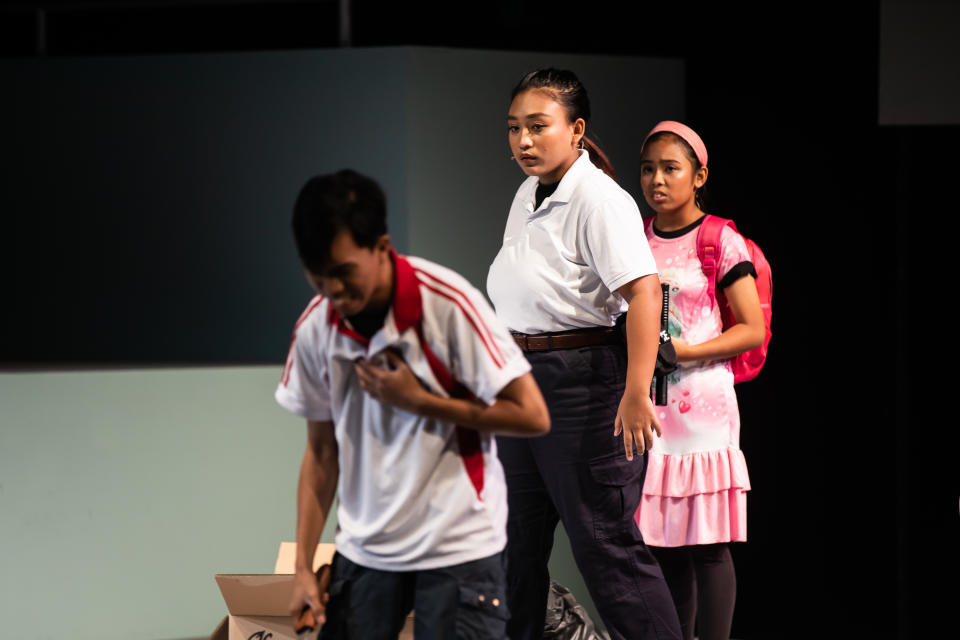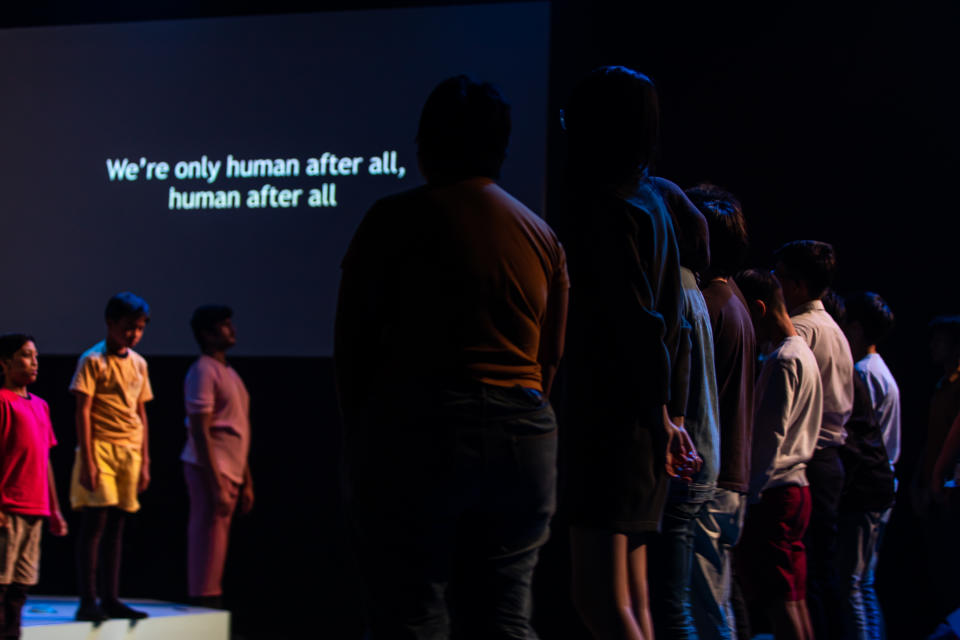Youths living in rental flats express hopes and struggles through play

SINGAPORE — Muhammad Danny Azrin Abdullah, 19, knows two friends who are currently on the death row for trafficking drugs.
Police presence is a constant - as with gang influence - where Zakia Fathiha Zaharul Hendrey, 17, lives.
Both teenagers are members of the Bukit Merah rental flat community in Singapore - and part of The Community Theatre, an initiative by Beyond Social Services which involves youths mostly from low-income families.
Earlier this month, the real-life experiences of the duo and 11 other peers living in one-room rental flats, aged between 13 and 24, were depicted in The Block Party, a play staged at the Esplanade Studio in early August.
Along with 10 volunteers from more privileged backgrounds, the teens took on multiple roles as different characters on stage, choreographers and costume managers behind the scenes.
The play was one of three featured in this year’s M1 Peer Pleasure Youth Theatre Festival, all of which sought to tackle misconceptions about poverty in Singapore.
The other two were performed by students from Anglo-Chinese School (Barker Road) and Anderson Secondary School.
Izzaty Ishak, The Block Party’s assistant director and Beyond community worker, said the play is The Community Theatre’s biggest production since it was set up in 2014 and the first to be held in a “professional theatre space”.
Prior to it, the initiative had staged seven forum theatre productions performed at the blocks of rental flats.

The play - described by Izzaty as “80 per cent” factual - was a culmination of a one-and-a-half year effort where the youths interviewed others also living in rental flats and read up on Singapore writer Teo You Yenn's This Is What Inequality Looks Like.
The group of youths, most of whom know at least one family member who has been imprisoned, also shared among themselves their experiences of living in rental flats and acted as “tour guides” for artists visiting their community.
“They never thought their stories were important, and now people want to hear (them). To feel that they are being heard builds a lot of dignity and identity for them,” said Izzaty.
These stories include ones that are not often heard in everyday life in Singapore, such as themes of homelessness, drug use and trafficking, as well as inequality.
One particular scene in the play took reference from a youth whose father, a cleaner, would pick up useful items such as bags and stationary for his children from rubbish bins.
While such behaviour is typically looked down upon by others, his children see him as a treasure hunter, said Izzaty, who stressed that the play’s aim is to enlighten others on the “different faces” of poverty.
“It’s not just...the lack of money. It’s also the strength of those living in poverty, and how they are creative in overcoming their struggles,” she added.
Danny, a third-year finance services student at the Institute of Technical Education (ITE) College Central, said the “bad company” he kept with in his younger days were often misunderstood.
“If you were to know them better, it’s not their choice to be like that. It’s the environment and their upbringing...Majority of them (partake in illegal activities) for financial reasons,” the eldest of six siblings added.

The Lengkok Bahru resident said, “Not everyone do it because they want to do it. For teenagers like me, we don’t want to be a burden to our family.”
Zakia Fathiha, a first-year hospitality operations student at the Institute of ITE College West’s, described her neighbourhood as the dangerous “ghetto side of Singapore” but one where the community is close-knit.
She recounted coming back from a rehearsal at night and spotting four police cars in the vicinity - a common sight in her neighbourhood.
“There was a gang fight. All of them were teenagers, kids that I knew from primary school and secondary school,” said Zakia Fathiha, who played a police officer and teacher in The Block Party.
When her friends came over to her flat for the first time, they were met with stares from residents “because it’s like bringing fresh meat into a dog pound”, she noted.
And while spending time alone at home was one way of keeping away from bad influences and having some privacy, the lack of physical space to be oneself could be depressing, said Zakia Fathiha.
“Sometimes I feel like there isn't much privacy to what's going on because everybody knew each other. So whatever you say, it travels so fast. There's no space for you,” she noted.
This “normalcy” she was familiar with was something foreign to a segment of people in Singapore, she later found, after speaking to students from Anglo-Chinese School (Barker Road) after their full-dress rehearsal.

“They honestly didn’t know rental flats were a thing. They thought we were like ‘Airbnb’ and they admitted that they have made fun of us before,” said Zakia Fathiha. “They...immediately apologised because they didn’t understand what we went through.”
“But I am glad they know we are alive. We don't live in luxury spaces,” she added.
According to the Housing Development Board (HDB)’s latest annual report, there are 29,842 one-room rental flats in Singapore. Out of this figure, the biggest clusters of such flats are in Bukit Merah and Kallang/Whampoa.
Paralegal assistant Syania Shaharuddin, 20, who has volunteered at The Community Theatre for four years, recalled that the reality of poverty in Singapore hit her hard when she heard of such personal encounters from the youths living in rental flats, some of whom she has become friends with over the years.
“I do read articles about (it) but because you're so disconnected, you read it as a story, another plot line,” noted Syania, adding that The Block Party would hopefully bring home the message that poverty in Singapore exists, “as cliche as it sounds”.
Sharing the sentiment, Zakia Fathiha said, “I want the audience to understand that while we might live in a very happy country, we have such sad places - small, small places that inflict so much pain.”

Related stories:
Life's a beach: Entrepreneur writes book on surviving homelessness in Sembawang Park


